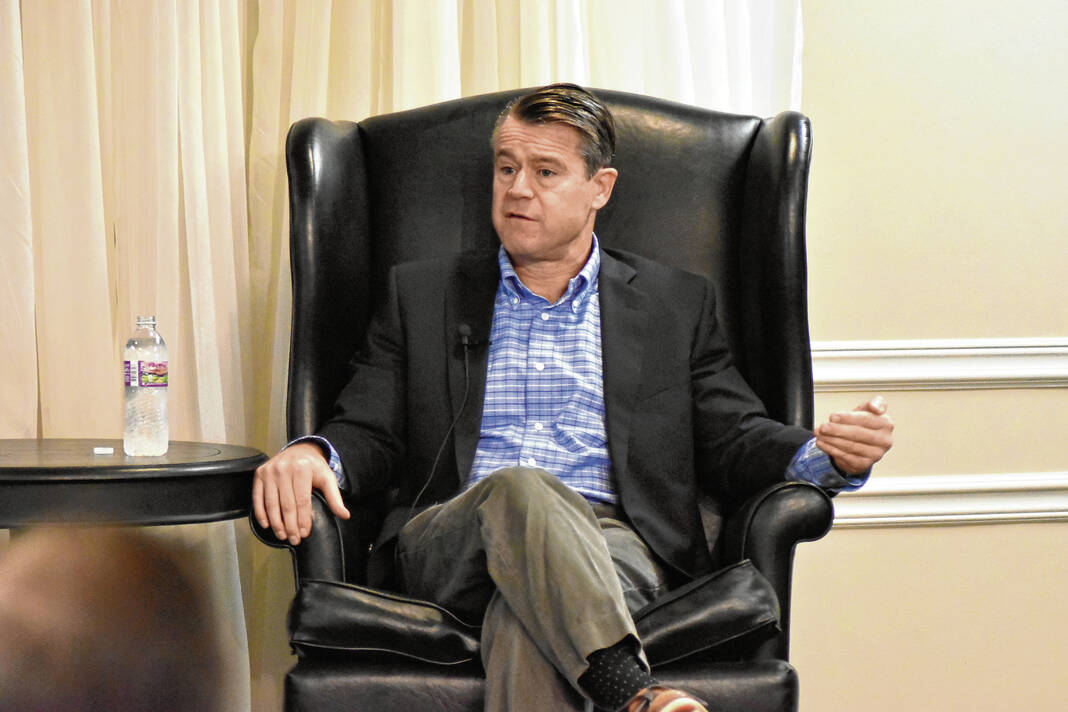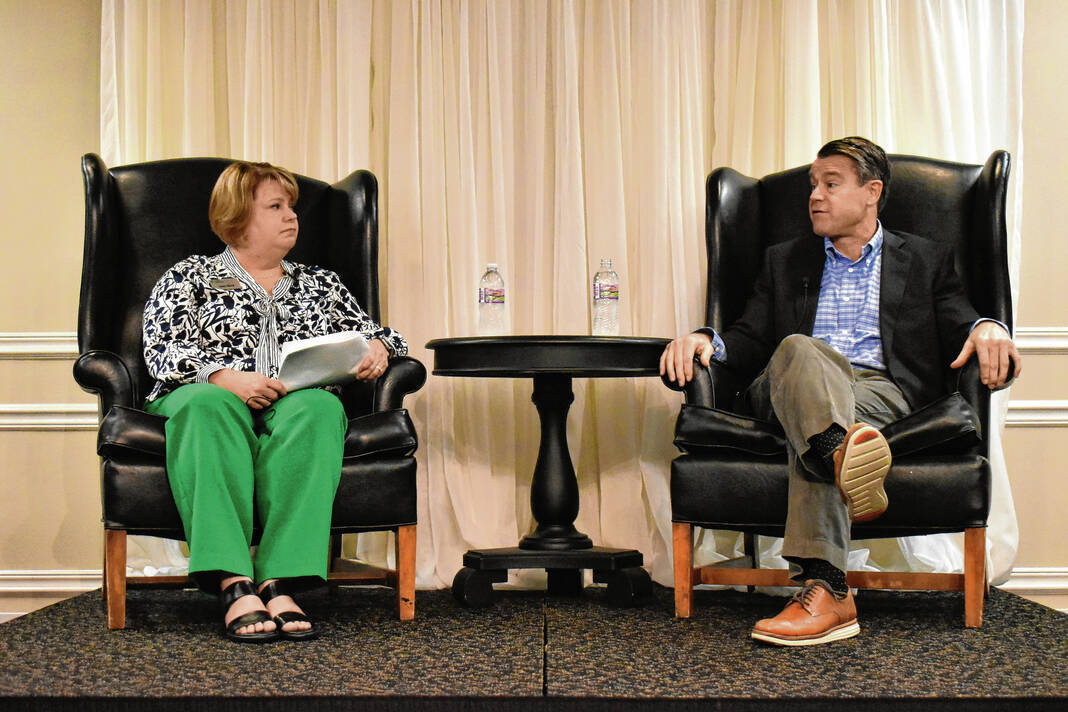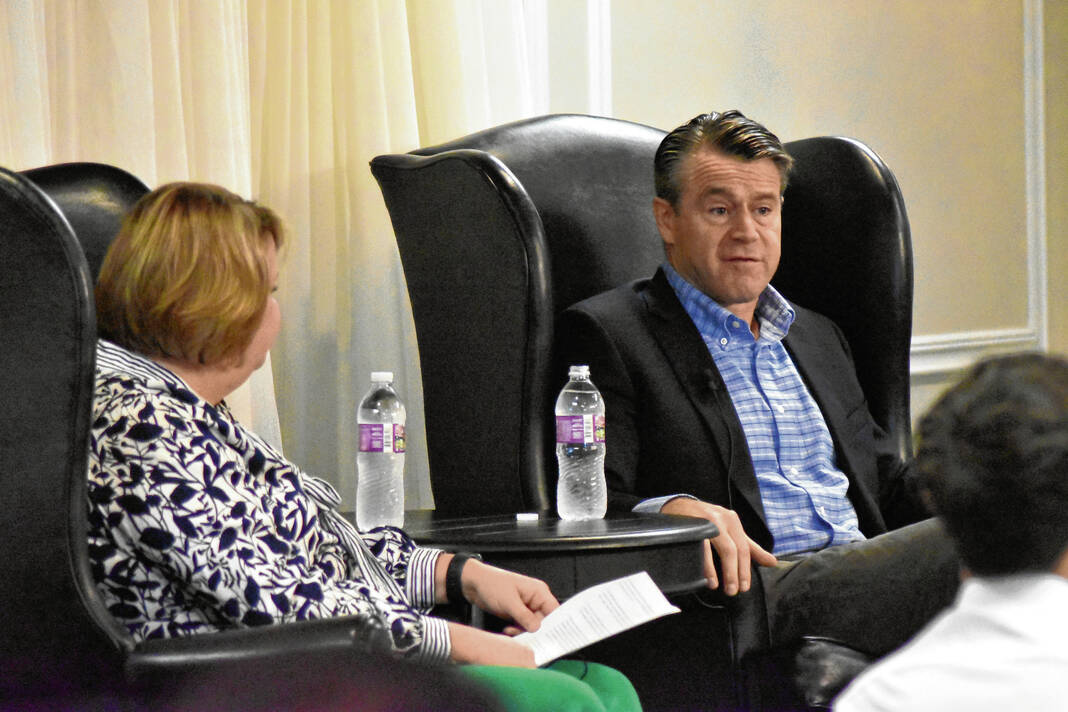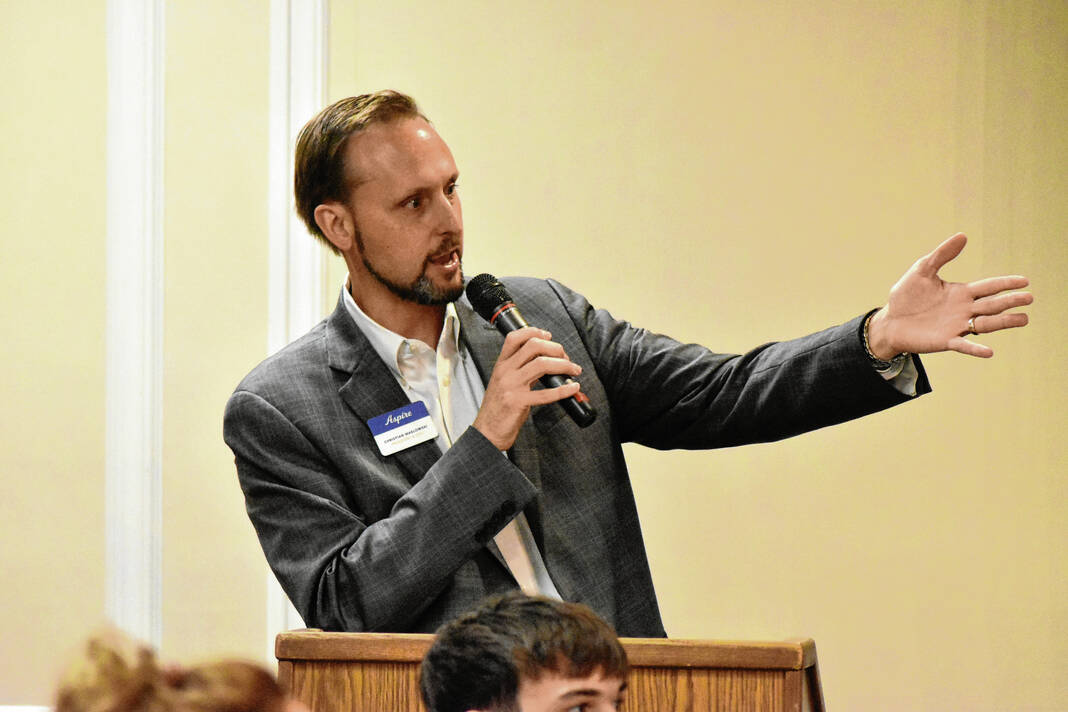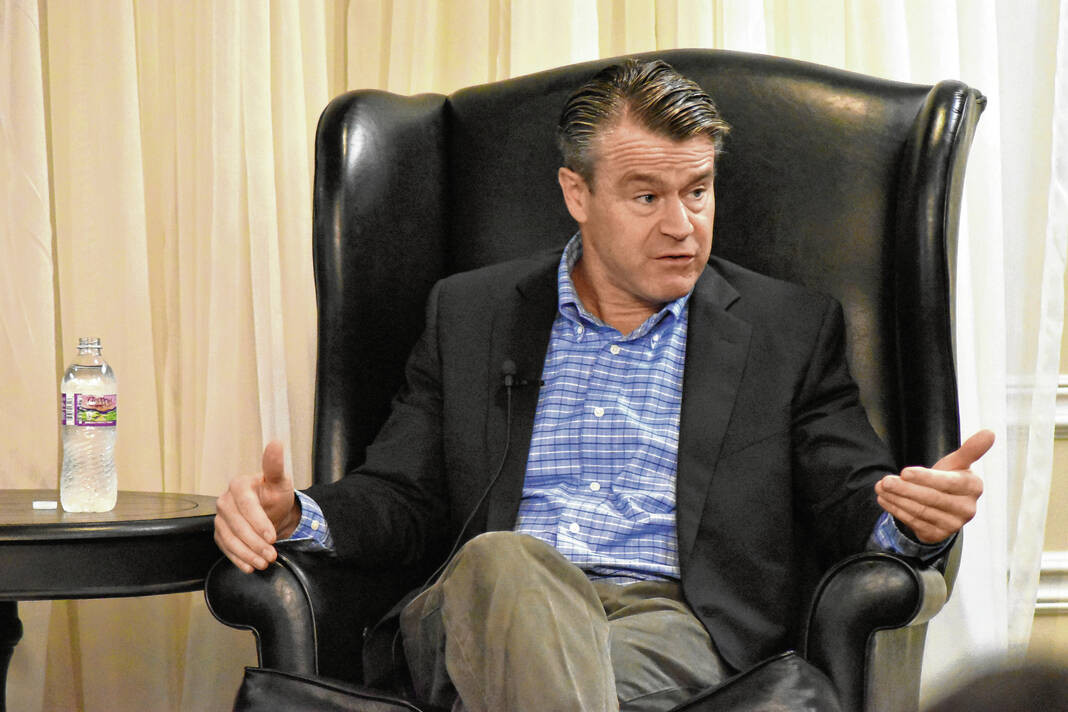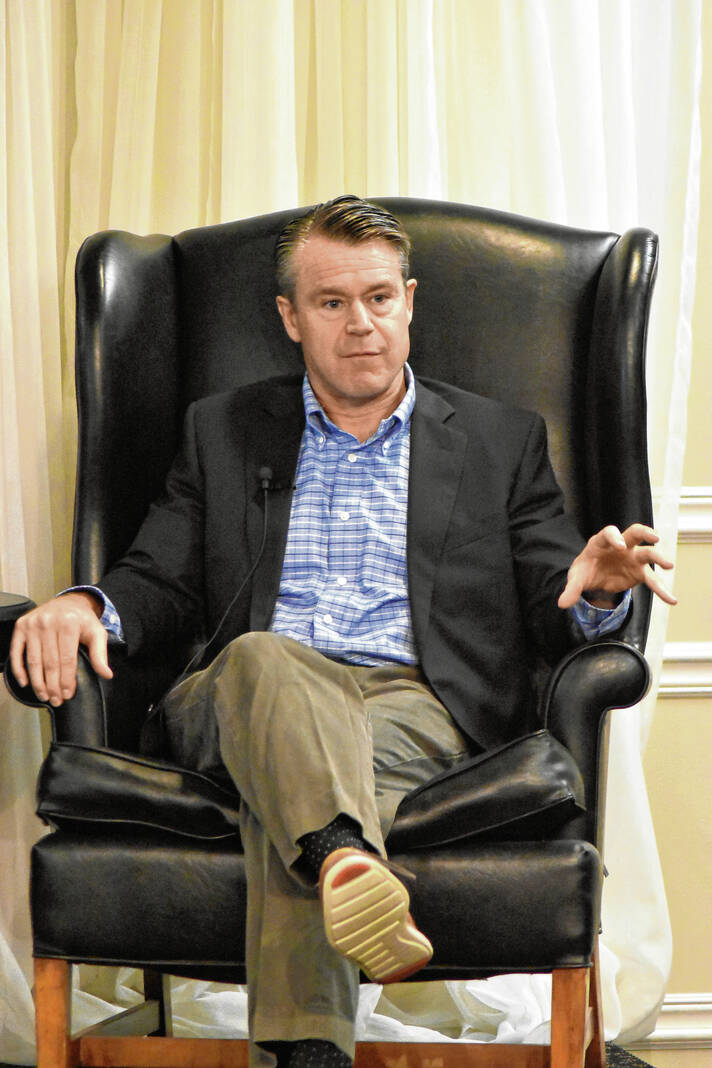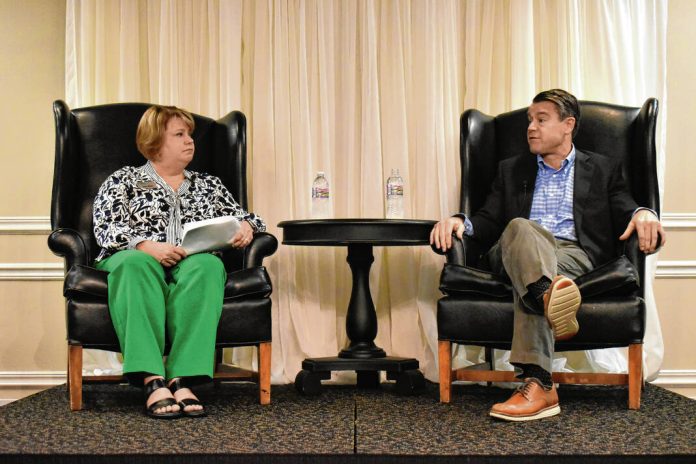
U.S. Sen. Todd Young, R-Indiana, right, answers a question from moderator Jean Renk, of Duke Energy, during an Aspire Johnson County event Thursday at Valle Vista Golf Club in Greenwood. Noah Crenshaw | Daily Journal
The senior U.S. Senator for Indiana discussed his legislative efforts and answered economic questions from business leaders at a chamber luncheon Thursday in Greenwood.
Sen. Todd Young, R-Indiana, was the featured guest at the latest Legislative Matters event held by Aspire Johnson County, the county’s chamber of commerce and economic development organization. For over an hour, he discussed his legislative efforts, artificial intelligence and more with Aspire members and the Daily Journal during and after the event at Valle Vista Golf Club in Greenwood.
Before answering questions from moderator Jean Renk, community and government relations manager for Duke Energy, and Aspire members, Young first addressed the legislative process. Despite what people may think, senators can be very accessible, he said.
He also addressed a misconception about the job of a senator, saying it is more than giving speeches and appearing on television to “say provocative things.” The job is to stand up and fight for American values, for example, but also to make laws, Young said.
“For a regular American, this can be a boring exercise. It requires detail. It requires thoughtful study. It requires countless hours of relationship building and negotiation and improvement of existing models and solving problems,” Young said. “And I have to say, with running the risk of sounding like we’re bragging, our team’s really good at it.”
CHIPS Act
One of Young’s more recent achievements in Congress is being an author of and helping pass the CHIPS and Science Act into law in 2022.
Young and his colleagues, working with many stakeholders, conceived the idea of the bill some years ago to shore up U.S. supply chains, particularly for advanced semiconductors. America has become dependent on getting semiconductors, and other technologies, from Asia, and these dependencies can impact the economy, he said.
These chips are used in everything from cars to cell phones to nuclear submarines. Tampering with the supply of these things can put American life in jeopardy, Young said.
The pandemic is proof of how a shortage can negatively affect the country.
“When the global pandemic hit, people got it okay. Aren’t enough semiconductors, I can’t find a toaster at Walmart.”
The law’s benefit to Indiana is “enormous,” Young said. Manufacturers in the state can make the conductors, providing workers and their communities more wages, he said.
The industrial Midwest has often been overlooked for federal investment, and sometimes even private investment, he said. the CHIPS and Science Act changes this, with Young highlighting the SK Hynix project in West Lafayette as an example. That project from a South Korean chip maker is bringing a $4 billion investment, the Indianapolis Business Journal reported.
“This investment by SK Hynix will double the assessed value of West Lafayette, Indiana,” Young told business leaders. “That’s one point, not even to speak of the broader ecosystems of suppliers and the second and third order relationships, who are seeing a massive demand signal already for their products.”
Judgeships
Efforts to add more judges to federal benches by Young also had some progress this year, with the Senate’s passage of the JUDGES Act of 2024, which he co-authored. The bipartisan bill addresses judicial emergencies and shortages by increasing the number of federal judges in courts across the country, including Indiana, which would receive one additional judge.
“Too many Americans have had their disputes delayed by a clogged up court system for decades now, and so we aim to finally solve that problem,” Young told the Daily Journal after the event.
Young believes the bill has a “very good chance” of being taken up the House, but if it doesn’t it would likely be another four years, or maybe more, until Congress would “seriously consider adding more judges to the federal court system. This is because of uncertainty about who the president will be and which party will be nominating judges, he said.
“It’s very important that Congress acts right now, and I’m proud that the Senate did so,” Young said.
Artificial intelligence
The rapid rise of artificial intelligence, a predictive technology, was also discussed at the event. There is great potential with this technology, as it can be used in a variety of fields — including in war, Young said.
A regulatory framework will be needed for AI, however. In the future, there’s a chance if it gets into the wrong hands, AI could be used destructively, he said.
“You could imagine someone, rather than coming up with a cure for cancer, that says, ‘OK, that COVID thing is pretty wicked. Let’s make it about 50 times more wicked.’ I’ll let you contemplate that future,” Young said. “So, how do you regulate against that?”
Over the last year, Young and a handful of other lawmakers have been learning about these problems and hearing from technology leaders about how to address them and how a regulatory structure could look. One bill is called the Future of Artificial Intelligence Innovation Act, which would establish a small White House office to work with AI companies on an ongoing basis to start with voluntary regulator standards, Young said.
“And then if more is necessary, Congress can always act,” he said.
Another bill would “democratize” the ability to train the algorithms. For AI, they need a lot of data-trained algorithms and there are “massive” public data sets that could be unlocked and given to researchers, he said.
“We want to give some access to the ability to train these algorithms, and give a small amount of the computer chips to researchers who are working in our universities and government labs so that Google and Facebook and X won’t have what is effectively a monopoly on AI technology,” Young said. We don’t want monopolies to spend for a lot of reasons, so I think those bills are going to pass it before year’s end.”
Child care
Renk asked Young about child care legislation that Young helped reintroduce earlier this month. The Child Care and Development Block Grant Reauthorization Act of 2024 would strengthen child care services, increase the supply of child care providers and improve the program to support families and providers in pursuing quality, affordable childcare, according to Young’s office.
Senators also recently failed to pass a child tax credit during a tax bill. There’s a “fair amount of debate” about this credit, and Young expects that to continue, he said.
Over the next few years, Young expects to see more debate around family policies and what lawmakers should be doing to support working parents and those who want to have children, he said.
If people want to have children, Americans all collectively benefit, so lawmakers should be supporting “part of who we are, part of what we value.” But at the same time, if lawmakers ask taxpayers to pay, they need to make sure it is targeted and well-designed so they don’t incentivize too much to make people not want to enter the workforce, Young said.
As for the Child Care and Development Block grant, Young said the existing program for low-income families needs to be more generous. Lawmakers need to expand the program, while at the same time telling people they need to work and pay their own way. He also added it needs be made more of a value proposition to try to mitigate the problem altogether.
Housing, other topics
Young was also asked about affordable housing. Washington has been “deeply involved” in housing for generations, but there are ways lawmakers could incentivize better behaviors, he said.
While not necessarily an issue in Indiana, local land use and zoning policy has been a great issue of contention, Young said.
He also highlighted his Yes In My Backyard Act, which would include an increase in the Low Income Housing Tax Credit. This bill has bipartisan support and would likely be the base bill for other housing-related legislation, he said. The bill has been introduced in other sessions but not yet passed.
Other highlights of Young’s discussion include his thoughts on term limits. He supports term limits but doesn’t think it will ever be achieved on a voluntary basis.
The best way to get it to work is to have a constitutional amendment, which he has signed onto and supports.
“But in the end, people are going to have to insist that becomes law and that it applies to everyone,” Young said
Young was also asked about whether business should be concerned about BRICS, an organization made up of Brazil, Russia, India, China and South Africa, and their “de-dollarization” efforts. De-dollarization is the process of moving away from the world’s reliance on the U.S. dollar, or USD, as the chief reserve currency.
BRICS efforts are to “undermine” the rules-based order the U.S. established after World War II, which included establishing organizations like the World Trade Organization and the United Nations. Americans should be concerned about their discussions of creating an alternative to USD, Young said.
If they were to consider cryptocurrency, as an example, it could cause negative effects on U.S. and Western markets, Young said. He acknowledged he wasn’t an expert on the issue, but said the U.S. needs to figure out how to stabilize its debt to gross domestic product ratio and how to use diplomacy to keep their counterparts buying and using USD and not investing in “sovereign cryptocurrencies,” he said.


